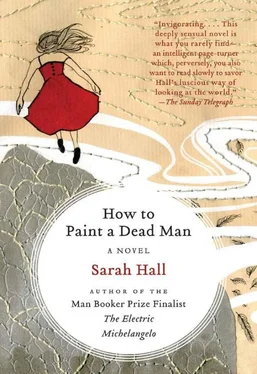Sarah Hall - How to Paint a Dead Man
Здесь есть возможность читать онлайн «Sarah Hall - How to Paint a Dead Man» весь текст электронной книги совершенно бесплатно (целиком полную версию без сокращений). В некоторых случаях можно слушать аудио, скачать через торрент в формате fb2 и присутствует краткое содержание. Год выпуска: 2009, Издательство: Harper Perennial, Жанр: Современная проза, на английском языке. Описание произведения, (предисловие) а так же отзывы посетителей доступны на портале библиотеки ЛибКат.
- Название:How to Paint a Dead Man
- Автор:
- Издательство:Harper Perennial
- Жанр:
- Год:2009
- ISBN:нет данных
- Рейтинг книги:4 / 5. Голосов: 1
-
Избранное:Добавить в избранное
- Отзывы:
-
Ваша оценка:
- 80
- 1
- 2
- 3
- 4
- 5
How to Paint a Dead Man: краткое содержание, описание и аннотация
Предлагаем к чтению аннотацию, описание, краткое содержание или предисловие (зависит от того, что написал сам автор книги «How to Paint a Dead Man»). Если вы не нашли необходимую информацию о книге — напишите в комментариях, мы постараемся отыскать её.
, Sarah Hall, "one of the most significant and exciting of Britain's young novelists" (
), delivers "a maddeningly enticing read... an amazing feat of literary engineering" (
).
How to Paint a Dead Man — читать онлайн бесплатно полную книгу (весь текст) целиком
Ниже представлен текст книги, разбитый по страницам. Система сохранения места последней прочитанной страницы, позволяет с удобством читать онлайн бесплатно книгу «How to Paint a Dead Man», без необходимости каждый раз заново искать на чём Вы остановились. Поставьте закладку, и сможете в любой момент перейти на страницу, на которой закончили чтение.
Интервал:
Закладка:
For two weeks there were no lessons, but when he returned he brought a gift for her and said that she might take it home. It was a bottle. He said it had been one of his favourite tools and in it was all his life’s work. He said he was very glad to have met her, even so late in his life. She did not know why he had given her the gift or what he meant. It was an old bottle, with flakes of paint on it, but she cherished it. He came to the school only once more, and for that lesson he had to remain seated while the children carried their work over to his chair.
Until then Annette brought flowers into school for the drawing classes, which she stole from the stone storage room of Castrabecco. She would wait until her mother was talking with Mauri beside the van, then take a cutting. She would shake beads of dew from the stems, place them down inside her pinafore and button up her cardigan. If Uncle Marcello saw her hiding the blooms he would tiptoe over to her and hold his finger to his lips. ‘Shh. I will keep your secret. Don’t get pollen on your dress.’
Whichever the stolen item, Annette would tell Signor Giorgio about its folk history. ‘The first bell in Nola was made because a bishop saw these growing in a clearing nearby,’ she would say, pointing to the peal of campanulas on the table. Then she would gently tap the stem to make the flowers sway. ‘See.’ She would offer any such note of plant trivia her uncle had told her, and her tutor would clap his hands together and say, ‘Marvellous!’ When he died she felt as if she had lost someone very special, like a grandfather. She returned the bottle to him, placing it on his tomb in the cimitero di campagna, and continued to bring him flowers.
The Mirror Crisis
The worst part was having no idea-not an inkling, not the faintest glimmer of sadness, like dew in the corner of your dreams. You had no clue that Danny had veered his bike on to the motorway, that he was swerving cheerfully from the hard shoulder to the third lane and back again, like the apparition of an Edwardian soak, a century late for a midnight appointment. Danny, on top of that brilliant contraption, perfectly balanced, bare-chested and wearing moleskin trousers, making one of his impromptu nocturnal runs to the farm. Danny, high as a kite, kept warm by the ardent adventure that was his life and by the bowl of dope he’d smoked, the empty road before him, the winter frost and icy moonlight.
Now it’s clear. Now you can see it all. A man and a bike on the carriageway at night, like a silent-picture routine. The starry darkness. The lisping wheels of that revolutionary machine going, for fifteen immortal minutes, the perfect speed. Danny with the world to himself. Danny weaving, standing up on the seat. Danny steering hands-free. Danny flying. How close it must have been to rapture. Now you can see it all.
But that night you slept right through as he pedalled on. You barely turned beneath the covers or altered position. There were no terrors, no anxieties nesting in your brain; there was no unconscious euphoria as your brother freewheeled. You found out by the trilling of the telephone the next morning what had happened. Peter Caldicutt told you the news and he was gutted, hollowed out of himself. There was not a trace of the Geordie, no hint of the decades in Cumbria. All that came from him was that awful empty voice, immaculately reproduced down the wires, and caught in the same quiet loop, whispering over and over. He’s gone. He’s gone. He’s gone. Then you heard gentle words and your mum took the receiver from him. No lights. Danny had no lights on the bike, she explained. The wagon driver didn’t see him until it was too late. You didn’t know. We thought…we thought maybe…
They must have imagined that, subconsciously, something bad would have registered. That by the powers of gestational unity and the currents in your cerebella, you would already have known. But no. You didn’t know. All night your ear had been folded over like a clamshell on the pillow. You were switched off. Severed. Independent. Healthy. You didn’t sit bolt upright in bed, fumbling for the lamp and screaming. You didn’t even reach for the glass of water on the bed-stand as you usually do midway through the night, and feel, for one brief moment before falling away again, an inexplicable sadness, or phantom pain.
You were standing naked and damp from the shower, holding the phone. You’d slipped on the bath mat in an effort to get to it before it rang off. You thought it might have been work-related. In the stillness after you hung up, you felt a bead of water trickle across your stomach and down your hip, and then you felt that dissolving feeling you have had ever since.
Nathan had already left for work. You could have called his mobile and had him come home, but you didn’t. You stood dripping on the hall floor. You could feel your cells trickling away. Everything began to rush past. You put your hands on the phone table and the wood clucked under your grip, and you had to kneel.
When it passed you went to the bedroom and got dressed. You put on your best dress in fact, the one with the empire waist and the red silk panelling. You pulled on your brown leather coat and your sopping hair began to make dark stains on it. The closest bag to hand was an old satchel destined for the charity shop, propped by the front door. You put a few random things inside-underwear, jewellery, and your passport, inexplicably. You left your Leica in the studio, then, changing your mind, you packed it. You closed the door to the flat, locked it. You told yourself you were standing on the outside. You told yourself to move.
You have a car. It’s not often used in London, but it’s reliable. You could have driven, but you didn’t trust yourself to make the drive up country. Your hands were not working. You didn’t want to negotiate difficult traffic. You didn’t want to sit for hours on the carriageway in among the queues. And no, no, no, you did not want to pass the slip road on the motorway where Danny had begun his boyish joyride, which had led him, four miles later, to the axles of a lorry coming the other way.
You did not want to see a shrine. Radio Cumbria was broadcasting the news at ten now that you had all been notified. Across the county people would hear the announcement and pause, hands to their mouths. They would shake their heads, and they would say, Ah no, not Danny Caldicutt, not dippy Danny, not Dan the Man. Not the crazy fella from the scrapyard. Not the bass player from Dogtale. Not him. There would be flowers laid at the spot, you knew it, because Danny was known and was enjoyed by all; he was one of Cumbria’s favourite sons. Danny with his manic street introductions, his talkative pub personality, and his unsolicited lectures on ufology. Danny with his hemp bags and colourful shoes, the rounds-on-him and the experimental lentils, his given-away savings. Danny with his vast, reasonless smile. And one or two people would surely have clambered over the motorway embankment, slipped across the lanes between thundering commuters, and left a simple bunch of flowers on the median.
You made your way to Euston, stunned and silent, your body horribly disintegrating, but still cooperative. You found a discreet single seat on the Virgin main-liner, so that you wouldn’t have to face anyone. At Preston you were taken off by the train manager, then put back on the next one heading north, thirty-five minutes and one donated sedative later. You had cried so dangerously that all the other passengers had emptied from your carriage, as if they were afraid you were about to break the news, whispered in your ear by God himself, that the world was finishing, now, now, now.
No. This wasn’t the worst part. The worst part was not your inability to predict events, your failure to receive that dark neural information. It was not the five-hour locomoting asylum that passed through Wigan, Warrington Bank Quay, Lancaster, Oxenholme. It was not finding your dad up in the lime quarry, later that day, with a pick axe, exhausted, his hands pulped and bloody from hours of breaking stone, or seeing your mum, his mother, your mother, for once in her steady, meditative life turned inside out by grief, totally overcome. Even the funeral, which Nathan drove up for, was not as bad as you’d expected. The arrangements for Danny’s interment were fuelled by the adrenalin of having to do what needed to be done. With familial cohesion and endless pots of tea you bore the awfulness together.
Читать дальшеИнтервал:
Закладка:
Похожие книги на «How to Paint a Dead Man»
Представляем Вашему вниманию похожие книги на «How to Paint a Dead Man» списком для выбора. Мы отобрали схожую по названию и смыслу литературу в надежде предоставить читателям больше вариантов отыскать новые, интересные, ещё непрочитанные произведения.
Обсуждение, отзывы о книге «How to Paint a Dead Man» и просто собственные мнения читателей. Оставьте ваши комментарии, напишите, что Вы думаете о произведении, его смысле или главных героях. Укажите что конкретно понравилось, а что нет, и почему Вы так считаете.












